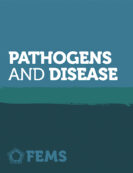FEMS Yeast Research Poster Prize: Wouter Van Genechten
Human Fungal Pathogens 2019 (HFP2019)
We are very pleased to announce the winner of the FEMS Yeast Research Poster Prize is Wouter Van Genechten, KU Leuven Belgium. The prize was awarded by Carol Munro at the HFP2019 Advanced Lecture Course: Molecular Mechanisms of Host-Pathogen Interactions and Virulence in Human Fungal Pathogens. The title of Wouter’s winning poster was: Improving Candida microscopy through codon-optimized fluorescent proteins and sub-diffraction microscopy. We interviewed Wouter to gain some insights into his background and research topics.
Wouter Van Genechten
What is your current position, and what was your scientific journey to get there?

I am a PhD student at the VIB-KU Leuven Center for Microbiology in the Patrick Van Dijck lab. I studied biochemistry and biotechnology at the KU Leuven with a strong emphasis on yeast research.
My bachelor project focused on drug-resistant Candida albicans isolates from clinical samples from Colombia and in my master thesis I investigated micro-nutrient receptors in Saccharomyces cerevisiae. Three years ago I applied for an FWO Strategic basic science fellowship which I obtained and which provides me with 4 years of financial support.”
Could you describe the research your poster covered?
On my poster I presented 5 codon-optimised versions of fluorescent proteins for Candida albicans and showed that codon-optimisation is not something trivial and that we still do not understand all the mechanisms of translational regulation. The optimised fluorescent proteins are then applied to perform super-resolution microscopy.”
What do you hope to focus your research on in the future?
Yeast research has been going very fast and only more recently, because of CRISPR-Cas, mammalian research is catching up. However, for some tools, the advance in mammalian systems was faster. For example biosensors for sensing calcium, PKA activation, phosphorylation status, GPCR dimerisation etc. are often applied successfully in several mammalian cell lines. However, expressing these sensors in yeast species and getting a decent result is not an easy feat.
I would hope to focus my research time on the optimisation and application of biosensors and other types of tools, these could be a significant advancement to the field. The final goal of my work is to use these tools as a readout for downstream signaling of the protein kinase A pathway, which is very important for virulence in fungal pathogen species.”
All but one of the FEMS journals are now fully open access (OA), with one journal, FEMS Microbiology Letters remaining a subscription journal with free-to-publish and OA options. Open access is key to supporting the FEMS mission of disseminating high quality research as widely as possible: when high quality, peer reviewed sound science is open access, anyone, anywhere in the world with an internet connection, can read it.







